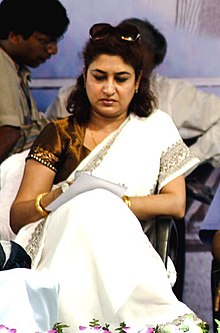Satabdi Roy | |
|---|---|
 | |
| Born | 5 October 1969 |
| Nationality | Indian |
| Occupation(s) | Actress, director politician |
| Years active | 1986–present |
| Works | Full list |
| Awards | BFJA Awards[1] |
| Member of Parliament, Lok Sabha | |
| Assumed office 22 May 2009 | |
| Preceded by | Ram Chandra Dome |
| Constituency | Birbhum |
| Personal details | |
| Political party | Trinamool Congress |
| Spouse |
Mriganko Banerjee (m. 2001) |
| Children | 2 |
| Residence | Kolkata |
| Reference[2] | |
Satabdi Roy ()(born 5 October 1969) is an Indian actress, film director and politician. As an actress she is known for her work in Bengali cinema.[3] She is the recipient of BFJA Awards for two times.[1] As an actress, she ruled the array of commercial Bengali cinema during the late 1980s and 1990s.[4][5] As a director, she has been denounced critically for her use of superfluous themes. She is a Trinamool Congress Member of Parliament, Lok Sabha since 2009.
Roy made her film debut opposite Prosenjit Chatterjee in Tapan Sinha's much acclaimed Bengali film Atanka (1986), which won her the BFJA Awards for the Best Supporting Actress in 1987.[6] She shot to stardom after she had been paired with Tapas Paul in films such as Amar Bandhan (1986), Guru Dakshina (1987), Antaranga (1988), Apan Amar Apan (1990) and Abishkar (1990) to name a few.[7] Her major hits with Prosenjit Chatterjee include Alingan (1990), Shraddhanjali (1993), Lathi (1996), Sakhi Tumi Kar (1996), Chandragrahan (1997), Ranokhetro (1998), Sajani Aamar Sohag (2000) and Trishul (2000) to name few. She made her Bollywood debut in National Award winning director Jyoti Sarup's Naya Zaher (1991). She collaborated with Tapan Sinha for the second time in his Antardhan (1992). She was conferred with the BFJA Awards for the Best Supporting Actress for the second time in 2005, for her performance in Raja Sen's Debipaksha.[citation needed] During her heyday, she was often compared to her contemporaries, such as Debashree Roy and Rituparna Sengupta.[8] She made her directorial debut with Abhinetri (2006), which was an unequivocal reflection of the life and career of Bengali matinee idol Suchitra Sen.[9] The film turned out to be a commercial as well as critical failure.
- ^ a b "Satabdi Roy Awards and Nominations". FilmiClub. Retrieved 24 May 2021.
- ^ "Detailed Profile: Smt. Satabdi Roy". Indian Government. Retrieved 23 May 2012.
- ^ "Satabdi Roy movies, filmography, biography and songs". Cinestaan. Archived from the original on 31 March 2019. Retrieved 31 March 2019.
- ^ "টালিউডের জনপ্রিয় অভিনেত্রী শতাব্দী রায়". Channel 24 (in Bengali). Retrieved 31 March 2019.
- ^ "রিপোর্ট কার্ডে দুই মেরুতে শতাব্দী, অনুপম". anandabazar.com (in Bengali). Retrieved 31 March 2019.
- ^ FilmiClub. "BFJA Awards 1987: Complete list of Awards and Nominations". FilmiClub. Retrieved 15 January 2023.
- ^ "তাপসকে খুব মিস করব: শতাব্দী". Eisamay (in Bengali). 24 April 2019. Retrieved 27 April 2020.
- ^ "দেবশ্রীর সঙ্গে ভালো সম্পর্ক ছিল না: শতাব্দী". EI Samay (in Bengali). Retrieved 16 September 2022.
- ^ "After Gangster, it's Metro". The Telegraph (India). Retrieved 19 January 2021.